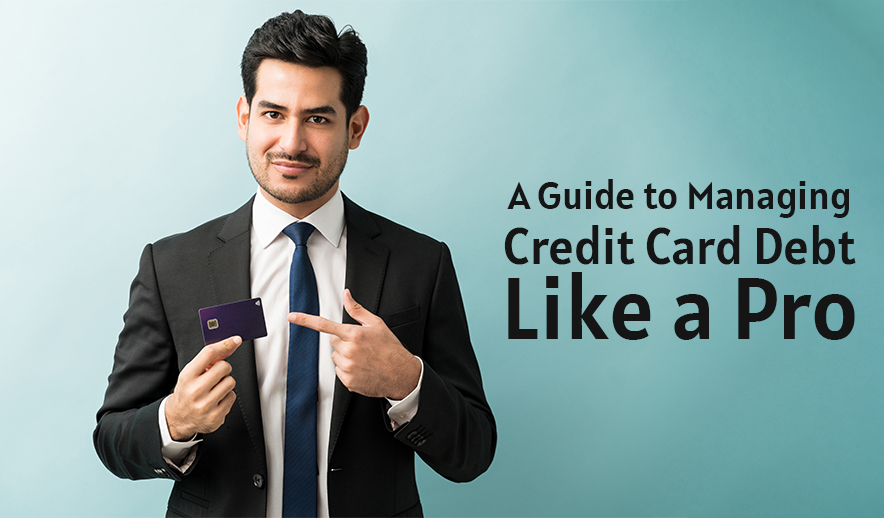
Taming the Plastic Beast: A Guide to Managing Credit Card Debt Like a Pro

Credit card debt management involves strategies and practices to effectively handle and reduce credit card debt. Here are some steps and tips to manage credit card debt:
Assess Your Debt: Begin by understanding the full extent of your credit card debt. Take stock of all your credit cards, outstanding balances, interest rates, and minimum payment requirements.
Create a Budget: Develop a budget that outlines your income, expenses, and debt obligations. Allocate a specific portion of your income toward paying off your credit card debt.
Prioritize Payments: Prioritize your debt payments by focusing on high-interest rate cards first. Paying more than the minimum payment each month can help reduce the principal amount and save on interest charges.
Negotiate with Creditors: If you’re struggling to make payments, consider contacting your credit card issuers to negotiate lower interest rates, reduced fees, or a repayment plan that better suits your financial situation. Some creditors may be willing to work with you to find a mutually beneficial solution.
Cut Expenses and Increase Income: Look for ways to reduce discretionary spending and free up more money to put towards debt repayment. Consider finding additional sources of income, such as taking on a side job or selling unused items.
Avoid Additional Debt: To effectively manage credit card debt, avoid incurring new debt. Try to use cash or a debit card for your purchases instead of relying on credit cards.
Seek Professional Help if Needed: If your debt situation feels overwhelming or you’re struggling to make progress, consider seeking assistance from a credit counseling agency. They can provide guidance, help negotiate with creditors, and develop a personalized debt management plan.
Stay Organized: Keep track of your payments, due dates, and progress in paying off your debt. This can help you stay motivated and ensure that you’re making consistent progress.
Financial Education: Educate yourself about personal finance and responsible credit card usage. Understanding how interest rates, minimum payments, and fees work can help you make informed decisions and prevent future debt accumulation.
Prioritize Debts: If you have multiple debts, prioritize them based on interest rates and urgency. Focus on paying off high-interest debts first while making minimum payments on other accounts.
Explore Debt Consolidation: Consolidating your debts into a single loan or transferring balances to a credit card with a lower interest rate may help simplify payments and reduce overall interest costs. However, carefully consider the terms and fees associated with such options before proceeding.
Explore Government Programs: Depending on your country of residence, there may be government programs or assistance available to individuals struggling with debt. Research and inquire about any applicable programs or resources.
Remember, taking proactive steps and being open and honest about your financial difficulties is essential. Avoiding the problem will only worsen the situation. By addressing your credit card debt head-on and seeking assistance when needed, you can work towards finding a viable solution and regaining control of your financial health.
If you are a credit card defaulter in the UAE and are facing financial difficulties, there are resources and assistance available to help you navigate your situation. Here are some options to consider:
Contact Your Credit Card Issuer: Reach out to your credit card issuer to discuss your situation. Explain your financial difficulties and inquire about any possible repayment plans or hardship programs they may offer. They may be willing to work with you to find a solution that suits your circumstances.
UAE Central Bank’s Debt Restructuring Scheme: The UAE Central Bank has implemented a Debt Restructuring Scheme to assist individuals facing financial challenges. This scheme provides an opportunity to negotiate with banks and financial institutions to restructure outstanding debts, including credit card debts. Contact your bank or financial institution to inquire about this scheme and explore the possibility of restructuring your debt.
Seek Financial Counseling: Consider seeking guidance from nonprofit credit counseling agencies in the UAE. These organizations provide professional advice, debt management plans, and financial education. They can help you assess your situation, negotiate with creditors, and develop a plan to repay your debts. Ensure the agency you choose is reputable and accredited.
Legal Advice: If your financial situation is severe and you are unable to come to an agreement with your creditors, it may be helpful to consult with a lawyer specializing in debt-related matters. They can provide legal advice based on UAE laws and regulations and guide you through potential options, such as debt settlement or bankruptcy.
Seek Assistance from the UAE Social Welfare System: In cases of extreme financial hardship, you may be eligible for assistance from the UAE’s social welfare system. Contact relevant government agencies, such as the Ministry of Community Development, to inquire about potential support programs available to individuals in financial distress.
It’s important to note that each individual’s situation is unique, and the options available may vary depending on factors such as the severity of your debt and your ability to repay. It’s advisable to seek professional advice and explore all available resources to find the best solution for your specific circumstances.



